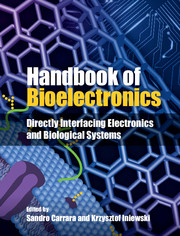Book contents
- Frontmatter
- Contents
- List of Contributors
- 1 What is bioelectronics?
- Part I Electronic components
- 2 Molecular components for electronics
- 3 Nanogaps and biomolecules
- 4 Organic thin-film transistors for biological applications
- 5 Protein-based transistors
- 6 Single-molecule bioelectronics
- 7 Nanoscale biomemory device composed of recombinant protein variants
- Part II Biosensors
- Part III Fuel cells
- Part IV Biomimetic systems
- Part V Bionics
- Part VI Brain interfaces
- Part VII Lab-on-a-chip
- Part VIII Future perspectives
- Index
- References
7 - Nanoscale biomemory device composed of recombinant protein variants
from Part I - Electronic components
Published online by Cambridge University Press: 05 September 2015
- Frontmatter
- Contents
- List of Contributors
- 1 What is bioelectronics?
- Part I Electronic components
- 2 Molecular components for electronics
- 3 Nanogaps and biomolecules
- 4 Organic thin-film transistors for biological applications
- 5 Protein-based transistors
- 6 Single-molecule bioelectronics
- 7 Nanoscale biomemory device composed of recombinant protein variants
- Part II Biosensors
- Part III Fuel cells
- Part IV Biomimetic systems
- Part V Bionics
- Part VI Brain interfaces
- Part VII Lab-on-a-chip
- Part VIII Future perspectives
- Index
- References
Summary
Abstract
Recent research in nanobioelectronic devices has opened up a new wave ofenthusiasm in revolutionizing electronic circuit design, marking thebeginning of a new era for biomimicry phenomena to advance into high-densitylogic and memory applications. This chapter describes the formation anddevelopment of a protein-based biomemory device composed of recombinantprotein variants, together with some experimental results on protein filmformation with various readout mechanisms for constructing future memorydevices. To elucidate the concept of the memory device, a redox protein inwhich cysteine residues were incorporated by recombinant technology wasimmobilized on a gold electrode surface. Application of the correctpotentials then causes carrier trapping or detrapping in protein films tooccur, as shown by the electrochemical measurements, thus performing thememory function. The chapter also summarizes recent research on nanoscalebiomemory devices, considering first the basic nature of thewrite-once-read-many (WORM) characteristics. The concept of WORM is thenextended to multi-bit storage of protein variants and towards development ofa nanoscale biomemory device. The fact that these developed devices,operating at very low voltages, can be patterned and addressed locally, andalso have good stability with excellent reversibility, makes them apromising platform for non-volatile memory devices.
Information
- Type
- Chapter
- Information
- Handbook of BioelectronicsDirectly Interfacing Electronics and Biological Systems, pp. 86 - 102Publisher: Cambridge University PressPrint publication year: 2015
